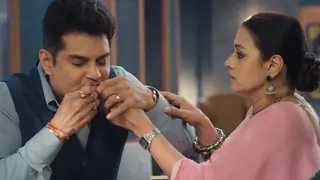Originally posted by: RamnVij
@ Maverick 29
Thanks for your detailed response and your analysis. I think you've outlined well, the web of fate, cause and effect that governs the way the world works.
I don't agree with your final analysis 😊. Not arguing with you on the facts of the tales here. But one of the Greatest features of Indian mythology, is that it lends itself to varied interpretation and shades of opinion.
My interpretation (inspired of course by the analysis and conclusions set out in books on the Mahabharata I had mentioned in my post earlier) is that the epic clearly implies all actions have consequences.
You know, there's a tale that when the feud between the cousins (Pandavas & Kauravas) became too bitter to contain, and the talk of handing over Kandavaprastha (the later day Indraprastha) to the Pandavas began, Bhishma was very upset at the thought of this division of the Royal House.
The story goes that he then approached the elders and leading wise men of Hastinapur, and asked their opinion of the correct course of action. Its really illuminating what they are reported to have said. "You never asked our opinion before taking your foolish vow. Why ask us now when the consequences of your action are finally bearing fruit?" 😊
The point of difference in interpretation is this: Could Puru, or Bhishma after him, have avoided the chain of circumstances leading to the war if they had acted differently? Did they not have any choice in acting as links in a Great Design? Or did they, by their actions, leave an imprint that would further push the Design one way or the other?
Is Dharma a rigid, unyielding truth set in stone? Or is it a complex, contextual truth? We come back again to the discussion between fate and free will 😊 I guess the scope of this debate would go on and on, so lets agree to disagree here 😊
On Khushi's actions, also, I would like to disagree a bit from what you have said. I don't really feel she is Very happy inside because of the selfless acts she does. She is an innately cheery person anyway, who loves to do things for others too much! This excessive sacrificing for others in fact makes her unhappy a lot of times, she is shown suffering and weeping through the consequences, when the ones she loves, misunderstand her motives and even malign her character!
Good discussion! First off, what I am about to write below is not meant to make this an argument or me trying to convince you that I am right. If I was doing that, it would mean that you have to somehow admit that you were wrong about something -- NOT my intention. I usually argue based on a simple philosophy -- "I will tell you what I think is right and what I know to be right. What you take out of it is completely up to you"! I am saying this up front so like you said this doesnt end up in being an unending argument.
Also, whenever a discussion like this starts, since the advent of the English thinking in India, people are generally divided into either "fatalists" or people that "believe in their actions". Reality is none of the Indian Ashtadhasa Puranas (18 puranas which go way before MahaBharata or Ramayana), make human like "fatalist". But how can you explain to people that dont learn the entire philosophy of Indian existence before criticizing "fatalism!!" or British interpretation of Indian Vedas as "something about raising cattle and utilizing cow dung"!!! Things that got stuck because obviously we were the guys that were RULED and they were the rulers. When I first talked to people from HK, I found something really striking about them -- they say "Indians liked being under the British rule, they wanted it right?" or some of my British friends who say to this day that "the British are the ones that united India -- made you think about Indian identity" -- so, half knowledge leads to so many misconceptions and perceptions that it is difficult to argue against. I was shocked by the folk in HK with whom I discussed Indian Independence movement. I got into fight with the British here in the US and in London for their stupidity -- only because they wouldnt admit that India has a really RICH history and tradition that we f**kED up ourselves -- Not the fault of the British they were just looking to make themselves RICHER -- it is people of India at that time that let their civilization get eroded -- look for another statement in the rest of this writeup to find where I kind of contradict my own "pride as Indian" -- a fun exercise.
Also, how can we fight the thought process that Ramayana and Mahabharata happened in the last 5 thousand years! When vedic mathematics puts the age of Ramayana as 1.8 million years which is the age of the Rama Sethu discovered by NASA scientists between India and Sri Lanka? How can you explain that when Ramayana talks about Rama being with Half-Apes we are talking Neandrathals who we knew coexisted with Homosapeins at the same time -- similar time frames and Hanuman was a blessed Neandrathal -- part ape, part human. So, this is completely up to belief. As I said, it is an argument, ones who want to believe will and others will want proof. There is proof but it will take time like everything and also FUNDING which is sorely missing!
I dont talk about these in public because it is bad for business. Anonymity helps in talking about these. Also, I am hoping to bring some "questioning" into the "branding" of discussions into "fatalism" and "a preset destiny" etc etc.
So, before I go into some details, I would say this -- if you have read Mahabharata patiently -- I am sure you read about 600-1000 pages of text, it is worth reading Bhagavat Geeta -- which is the summation of what Mahabharata really is all about. Yep Krishna tells Arjuna to go into battle against his own kin in this text but the most important part of the text is the teaching on "Karm" -- contrary to popular english interpretation, Karm or Karma is actually ones DEEDS/Duty -- the work we do. So Krishna tells Arjuna realizing that Arjuna is NOT a scholar in Indian Puranas that the only thing a human being can do is "Karm" -- He tells him "dont worry about consequences but just do what is right at that time". So, the teaching was "do what is right irrespective of the consequence" because consequence is not in your hands anyways. See the teaching really is "if you think about what is good for you, what you do keeps changing. But if you keep doing the right thing or your duty at the time, the consequence will take care of itself". At the time of war, after all the attempts to reconcile failed, it was Arjuna's duty in war to kill his kin. So, my point is doing this takes a lot more courage because you have to "Accept that what is going to happen is not in your hands". That takes courage. Going into the unknown thinking that by doing the right thing, everything will be good is a lot more difficult. The problem with this is Indians used it as "whatever we do GOD will take care of things" -- their brains didnt tell them that if you produce 10 children and expect to maintain a life style GOD will tell you that the consequence of that is what India is today. The subtlety here is "Do your duty" includes taking care of your children. You are responsible to use your brain and raise them with the comforts, give them a direction, teach them the right things etc. If you look most of these people dont understand Indian philosophy themselves but will say "It is all destined"!! So, the result is souls are born as humans but lead a life of an animal finding food on a daily basis with no time for anything else.
Now you asked a question -- Is Dharma a RIGID thing -- the "right thing" always tends to be.
A 19 year old who is a Son and whose Dharma towards his father is "do whatever it takes to make his father happy" as presented at that point has to do perform his Dharma -- Dwapara yuga with some people still believing in what Dharma really is. At that time he did NOT yet have the responsibility of his kingdom. It was his father's responsibility. At that time as opposed to now, a person following Dharma never questioned his father. Fathers rarely did wrong was their thought process.
So, if you place this in Ramayana -- the current crop will say that Rama screwed up when he left Ayodhya because Dasaratha gave into Kaikei. They dont understand that making his father reneg on his word will cause immense pain to Dasaratha in the karmic realm and hence to Rama as well. THe nay sayers now talk about the fact that Rama could have killed Ravana while staying King of Ayodhya by not listening to Dasaratha! Now how can a person be called "Purushottam" when he does things thinking about the consequences of his actions!!!
Think Parasurama, at that time just because Jamadagni thought that his wife was in love with someone else that is she was "fantasizing" about another man, he asked his son to go kill his mother. Parasurama is the 6th avatara but in today's language we say "who doesnt fantacize, this whole forum fantasizes about Barun"!!! But at that time Dharma was that everything was "MANASA VACHA KARMANA" -- with mind, words, and deeds -- you are someone's person. That doesnt exist today so we cannot judge that by today's standards.
Now there was another question you brought up which was Bhishma going to elders -- he did that over and over again. But you will never find him saying "he would have walked away from his oath" -- because he could have done it at any time -- even when he was worried about Pandavas and Kauravas, he still could ascend to the throne -- NO one including the elders would question him.
Now look at the elders at the time that Bhishma talked to -- It was Dronacharya and Krupacharya -- Drona was known as a great teacher but NEVER a Dharmic person completely -- he had already become imperfect. So was Krupa -- both were in laws. So, they were thinking "practical" which is the advent of Kali Yuga -- that is the reason they said several times that Bhishma should have ruled and this whole thing would be perfect. The ONLY dharmic person in that group was VIDHUR. If you look at what he says time and again when his great uncle comes to him is "you are the greatest there is" -- Bhishma was the original Mahatma because he did not worry about the consequences of his actions. The theory is "ONLY COWARDS WORRY ABOUT CONSEQUENCES" -- this is VASU himself there is no way he would worry. So, he was distraught as any human would and one that has "icha mrithyu" even worse but never really worried about his oath.
So, the fundamental thought that what happened in Mahabharata was wrong is itself in question -- the hind sight people may make that assumption but what happened in Mahabharata changed civilization as a whole. The imperfect heroes that we read about became the "norm" -- it was ok to be imperfect and over time this became what is Kali today. Mahabharat had 28 Akshohinis of Sena -- an akshohini of sena includes -- 21,000 chariots, 21,000 elephants, 65000 horses and 100,000 people. 28 such akshohinis fought. That was what was required to change the "world dynamic".
Now let us look at what we were talking about when you said "FATALISM" and "EVERYTHING BY DESIGN". This is totally on one's belief. EVERYONE during the Ramayan and Mahabharat days believed the following to be the basis of life -- this is in every purana (even Garuda purana that deals with what happens to a soul after death -- Vishnu who is guidance of all life and his transport Garuda are in the Garuda Purana) -- So, if you are reading those things, then you should also know that Valmiki Wrote Ramayana before it happened and Vyasa did the same with Mahabharata:
Human Beings have a soul -- all of us. Every religion even today believes that -- It doesnt matter if you are religious or not. Every soul has to experience certain growth in each life. That growth comes from our experiences in this life. So, our mindset, our thought process etc are such that we are going to experience these things. Think about it, how did a guy born rolling in riches privileged up bringing join forces with a half naked old man walking around the country to fight for independence of a country which has a population that hasnt realized the virtues of being FREE? -- NEHRU.
Why are we born to a certain set of PARENTS? Did we choose them? Why do we like what we like? If it is all about upbringing who with Mr. Dubey born in a village with no electricity like "engineering" get into IIT Kanpur build roads, be righteous and get shot at the age of 30? -- he was on Satyameva Jayate which I happened to catch yesterday.
There is a reason we are born where we are and we do what we do. Our history and our scriptures say "your destiny is set" -- how you go about getting there is HUMAN EFFORT -- your mind will not sleep or rest when your soul has to experience certain things. For instance, if your destiny is to remain in the dark about the final journey but enjoy wealth etc, you will fight like hell and make all the money. But you will never be enlightened that all this money will not result in anything. But, if you are Gates -- at $60bn you will realize that there are 2 billion people in Africa and India alone that are living at under $1.50 a day and helping that other life is a part of our journey. If you are Ambani, you will build a $1bn house.
That is the difference -- Destiny being set does not mean "put a candle in a hail storm and tell god to protect it" -- that is STUPID. God gave us mind to discern and do things but we have to know that what we are doing. as long as we know in hour hearts that it is right -- we will reach our positive destination.
This does not mean that we are always SO DAMN happy when bad things are happening. Who doesnt like to live like a KING. We love the worldly stuff -- our happiness exists on multiple levels. So a simple analogy is this -- When Sachin scores a hundred and Team India Loses -- he is happy that he performed well but he is unhappy that India lost. Similarly in case of Khushi -- her deep inner happiness is because she is doing the right thing. Her unhappiness is that "she is neither recognized nor give what is due to her" -- but that doesnt mean that she will get down about things!!! That is the whole ethos. When others recognize that they have wronged her and give her what she is due, it will be like Sachin SCoring a 100 and India winning the world cup the same day -- happening every single day!!!
Hope the philosophy makes sense. Indian Philosophy is not "fatalism" -- it just believes that we are all born with a purpose much bigger than what we do on a daily basis. The ones that are recognized among us kind of know their purpose while others spend their time earning a living and finding food and comforts for their daily existence.
Hope this makes sense. Again, it is all as friends -- I for the first time shared this with people. This is part of the "REAL" indian teachings that is usually killed within the ancient brahmin communities because it doesnt spread in India. My Great Grandfather and my Grandfathers were all Pandits in "Ancient Indian philosophy" --theory only -- not practice and their "saint like lives" meant that not many actually absorbed this!!!
Cheers.




























181